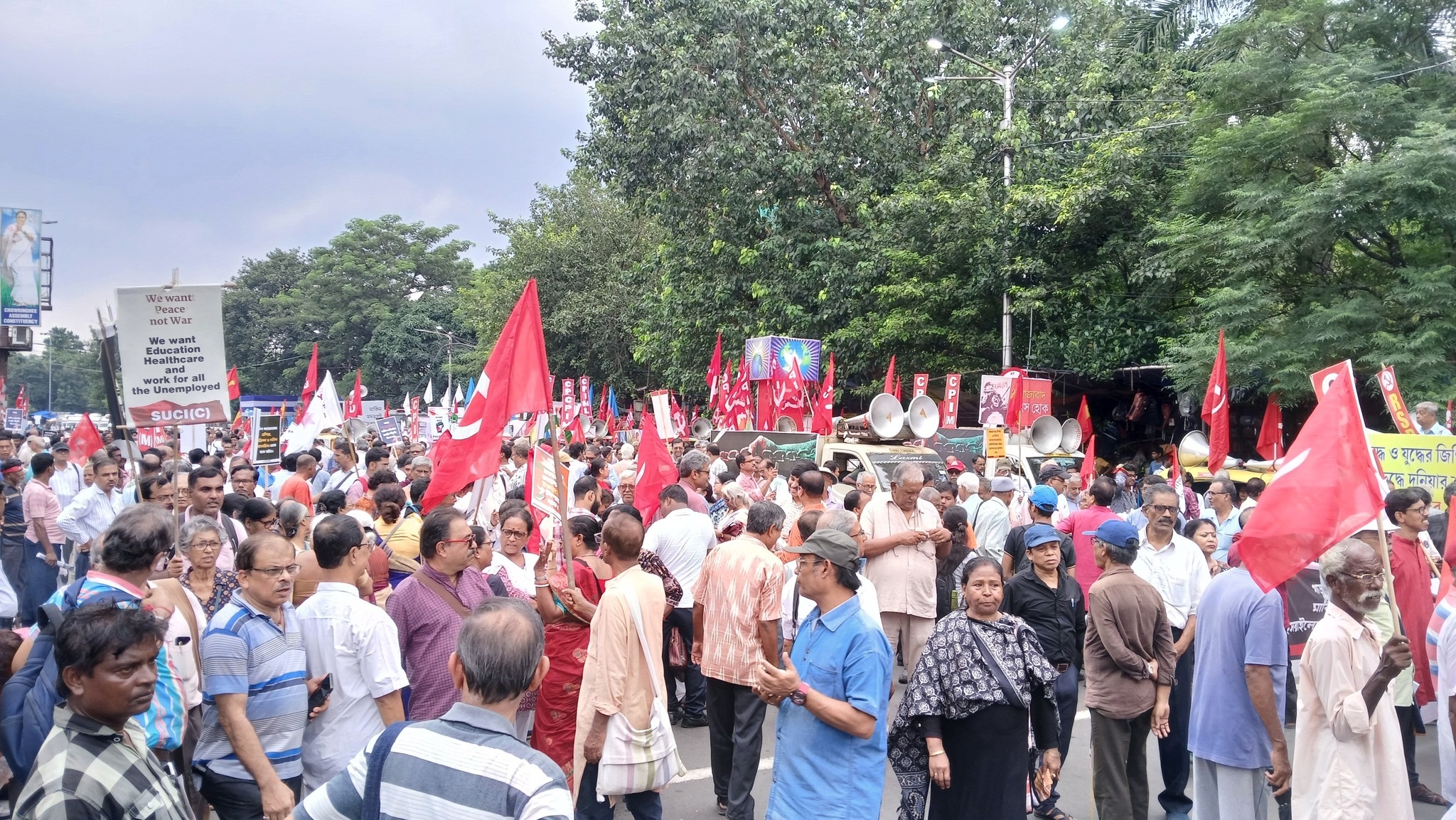
Samprikta Bose
ON September 1, International Anti-War Peace and Solidarity Day, Kolkata once again lived up to its legacy as a bastion of anti-imperialist struggle and a city that values peace above all else. In a powerful display of solidarity, a massive march, organised by ten Left parties, took over the streets of central Kolkata to condemn imperialist aggression and stand with the freedom-loving people of Palestine. This protest wasn't just a rally; it was a testament to Kolkata's historical aversion to war and its commitment to speaking out against global injustices.
The march was a powerful display of unity, directly addressing the genocidal attacks on Palestinians by the US-backed Israeli regime. Similar to previous years, the demonstration showcased lively tableaux featuring symbolic imagery such as doves and peace signs, along with striking visuals that conveyed steadfast support for the Palestinian people. Participants sang anti-war hymns and raised anti-war slogans. However, the message extended beyond solidarity; it served as a clear warning to the Modi government to cease its role as a junior partner to American imperialism.
This year's International Peace and Solidarity Day saw anti-war movements globally protesting the genocide in Palestine, and Kolkata's response was no exception. The joint call by the CPI(M), CPI, RSP, Forward Bloc, CPI(ML) Liberation, SUCI(C), RCPI, MFB, Workers' Party, and Bolshevik Party brought the city centre to a standstill. The march, which started from Dharmatala, filled Lenin Sarani and culminated at College Square, drew masses so large that Left Front chairman Biman Basu called it a "Maha-michil" (grand march), a title not easily bestowed. "We don't call every march a 'Maha-michil.' But today, I congratulate you for turning this rally into a grand march by taking to the streets against war," he stated.
The scale of the protest was immense. Before the march even began, the Dharmatala intersection was nearly paralysed by the sheer number of people gathering. Two marches from Howrah and Sealdah stations converged at the starting point and swelled the numbers, creating a human tide of protesters. While Left parties gave the call, the march saw participation from a broad coalition of student and youth organisations, women's groups, trade unions, and the All India Peace and Solidarity Organisation. The sea of red was punctuated by a mix of red flags, organisational banners, and the national flags of both Palestine and India, symbolising a shared struggle.
As the rally moved, bystanders watched as protestors marched with flags, hoardings, and posters. DYFI workers sold special anti-war bulletins, and folk singers performed, creating a powerful cultural backdrop. Near Calcutta University, large hoardings displayed heart-wrenching pictures of Gazan children, alongside a poignant poem: "If I have to write a poem that is not political / I must listen to the birds / and to listen to the birds / the warplanes must be silenced."
Leaders from various parties, including Biman Basu, Mohammad Salim, Surjya Misra, Swapan Banerjee, and Naren Chatterjee, joined the march, addressing the crowd with impassioned speeches. They highlighted Kolkata's rich history of anti-imperialist struggle, from the Indian freedom fight to the liberation of Vietnam.
In his address, Mohammad Salim drew a powerful parallel between India's freedom struggle and the Palestinian liberation movement. "India became independent by fighting against British imperialism, and we understand the meaning of 'freedom' and show solidarity with struggles for freedom everywhere. Only those who did not participate in India's freedom struggle belittle the liberation struggle of the people of Palestine," he said. He also took a jab at the current government, recalling how Left were once ridiculed for opposing American imperialism to protect India's economy, only to see the same government now facing a tariff war from the US and seeking alliances with nations it once demonised.
Salim ended with a call to action: "Those who divide the country based on religion, caste, and language and spread hatred... will not be able to fight against Trump's tariff war." He emphasized that the Left must raise its voice to unite the country and make it self-reliant, defending India against the forces of imperialism. The Kolkata rally was more than a protest; it was a vibrant reassertion of a city's core values – a refusal to stay silent in the face of global injustice and a demand for a truly sovereign India.


